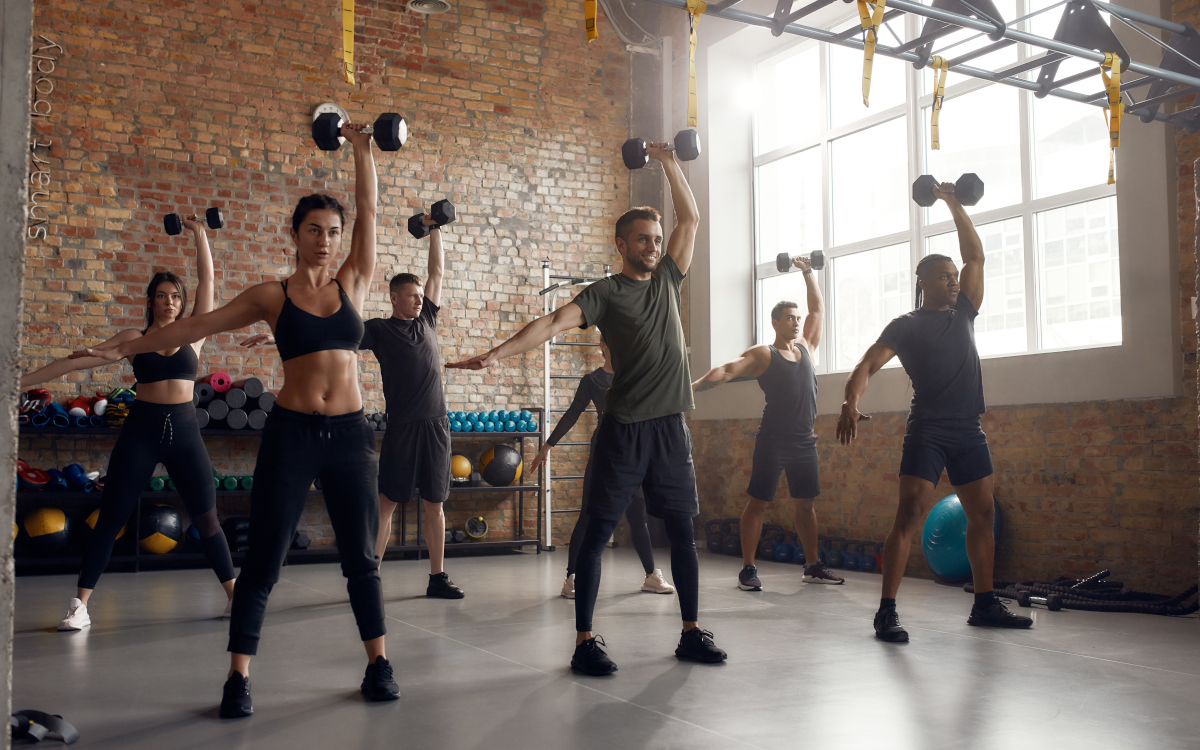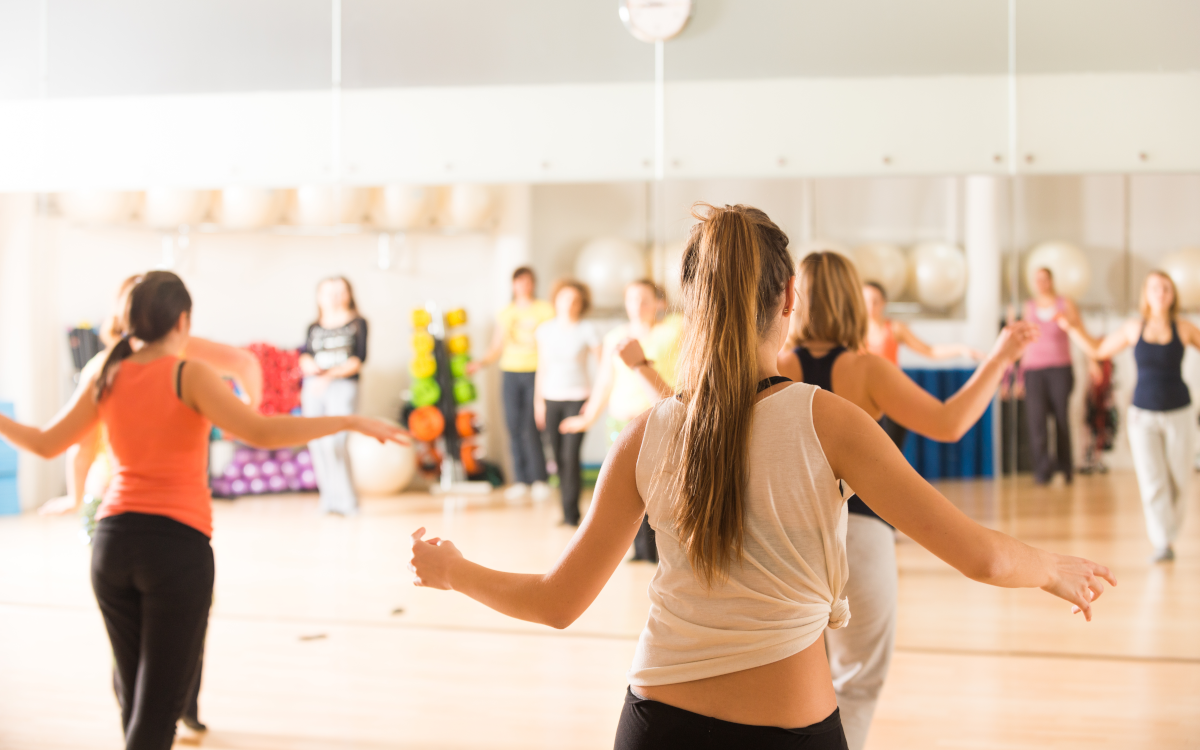Grab your cheat sheet |
Exercise is essential to maintaining great physical health. But, how does it improve mental health and wellbeing?
Here, we’re going to dive into how doing regular physical activity not only improves your physical fitness—but will also boost your wellbeing in a big way.
We’ll also explore the benefits of physical exercise and how you can use it to improve your mental health, boost self-esteem—and improve your mood.
Are you ready? Let’s dive in.
How does exercise improve mental health?

Did you know? Research shows that exercising improves mental health by reducing the impact of anxiety, depression, and negative mood.
Exercising and regular physical activity can also improve self-esteem and brain function. Numerous studies have shown that physical activity releases endorphins—also known as "feel-good" hormones—can lower the risk of chronic mental illnesses.
Regular exercise can also improve your memory, and increase focus and concentration. Bonus.
By adding more exercise to your routine and dialing up your efforts a notch or two, you’re likely to feel calmer and more energetic.
Read: How Important Is Nutrition For Fitness Goals?
15 benefits of exercise for mental health and wellbeing

Now that you know how regular exercise can improve mental health, generally speaking, let’s get down to the nitty-gritty and look at the benefits of getting active in a little more detail.
1. Improved mood
Exercise stimulates the production of endorphins, chemicals in the brain that act as natural mood lifters, leading to feelings of happiness and relaxation.2. Reduced stress
Physical activity can help reduce levels of the body's stress hormones, like cortisol, leading to a calmer state of mind. Regular exercise can be a tool to help people who struggle with mental health problems.3. Better sleep
Regular exercise promotes better sleep patterns, helping people fall asleep faster and enjoy deeper, more restorative sleep. And, relax.4. Increased energy levels
Engaging in physical activity boosts energy levels by improving circulation and delivering more oxygen and nutrients to tissues and cells throughout the body.5. Enhanced self-esteem
Exercise can improve self-esteem and self-confidence as people achieve their fitness goals, feel more capable, and experience a sense of accomplishment.6. Stress relief
Physical activity serves as a healthy outlet for releasing pent-up tension and frustration, helping to clear the mind and reduce feelings of anxiety and other mental health conditions.7. Improved brain function
Exercise enhances brain function by promoting better blood flow to the brain, which can improve memory, concentration, and overall mental clarity.8. Increased brain health
Regular physical activity has been linked to a reduced risk of cognitive decline and may help protect against neurodegenerative diseases such as Alzheimer's disease.9. Alleviation of depression symptoms
Exercise has been shown to be an effective complementary treatment for depression, as it can improve mood and alleviate symptoms of sadness or hopelessness.10. Anxiety reduction
Physical activity can help reduce symptoms of anxiety by promoting relaxation, improving coping mechanisms, and providing a body-boosting distraction from worry.11. Social interaction

12. Stimulation of creativity
Exercise has been shown to stimulate creativity by encouraging the brain to generate new ideas and solutions while reducing mental blocks and inhibitions. Awesome.13. Increased resilience
Regular exercise can build mental resilience by teaching individuals to push through challenges, setbacks, and discomfort, leading to greater emotional strength as well as coping skills.14. Improved body image
Engaging in physical activity can help people develop a more positive body image by focusing on what their bodies can do rather than how they look.15. Enhanced overall wellbeing
Regular exercise contributes to overall wellbeing by promoting physical health, mental clarity, emotional stability, and a real sense of fulfillment in life.Tip: Maintaining a balanced diet is also important to cultivating great health. Food, sleep, and exercise are vital to how your body and mind functions—so taking care of these areas contributes to your overall health.
How much physical activity is recommended to boost physical and mental health?
Getting stuck into a combination of physical activities and exercises is proven to have a positive effect on your physical and mental health.
But, how much physical activity do we actually need?
Well, according to the World Health Organization (WHO), it is recommended that adults engage in at least 150 minutes of moderate-intensity aerobic physical activity or 75 minutes of vigorous-intensity aerobic physical activity per week, along with muscle-strengthening activities on two or more days per week.
So, adding a combination of aerobic, strength training, flexibility, and balance exercises that you enjoy into your daily routine can significantly improve your mental and physical health.
Related: How Much Protein Should You Eat After A Workout?
What types of exercise can I do to improve my mental health?

Many types of exercises can improve mood by promoting the release of endorphins, reducing stress hormones, and enhancing overall wellbeing.
Here are some exercises which have mood-boosting benefits…
Aerobic exercise
Activities like walking, jogging, cycling, swimming, dancing, and aerobics increase heart rate and breathing, leading to the release of endorphins and improving mood.
Strength training
Weightlifting, bodyweight exercises, and resistance training not only build muscle strength but also stimulate the release of endorphins, promoting a sense of accomplishment and wellbeing.
Yoga
Yoga combines physical postures, breathwork, and meditation, promoting relaxation, stress reduction, and improved mood. Practices like hatha, vinyasa, and restorative yoga can be particularly beneficial for mental health.
Pilates
Pilates focuses on core strength, flexibility, and body awareness through controlled movements as well as breathing techniques. This leads to improved mood and reduced stress.
Tai Chi
Tai Chi is a gentle martial art characterized by slow, flowing movements and deep breathing. It promotes relaxation, balance, and mental focus, contributing to improved mood and overall wellbeing.
Dance

Dancing, whether in a structured class or simply moving to music at home, can uplift mood, increase energy levels, and promote self-expression and creativity.
Hiking
Spending time in nature and engaging in activities such as hiking or trail walking can reduce stress, improve mood, and enhance feelings of connection to the environment.
Group exercise class
Taking part in group exercise classes like spinning, Zumba, or group fitness sessions provides social interaction, support, and motivation. This can enhance your mood and make enjoying a little physical activity all the more fun.
Interval training
Interval training involves alternating between high-intensity bursts of activity and periods of rest or low-intensity exercise. This type of workout can improve mood by boosting endorphin release and increasing energy levels.
Outdoor activities
Outdoor activities such as gardening, running, cycling, or playing sports in natural settings can improve mood by reducing stress, enhancing relaxation, and promoting a sense of connection to the environment.
Mindful movement
Practicing mindful movement activities like qigong or Feldenkrais can improve mood by promoting body awareness, relaxation, and mental focus.
Water-based exercise
Swimming, water aerobics, or simply walking in water can be gentle on the joints while providing mood-boosting benefits through physical activity and the soothing effects of water.
Circuit training
Circuit training involves performing a series of exercises targeting different muscle groups with minimal rest in between. This type of workout can elevate mood by increasing heart rate, improving circulation, and promoting a sense of physical accomplishment.
Boxing or martial arts

Activities like boxing, kickboxing, or martial arts provide a physical outlet for stress and tension while promoting discipline, focus, and confidence, which can positively impact mood.
Recreational sports
Trying recreational sports such as basketball, soccer, tennis, or volleyball provides opportunities for social interaction, teamwork, and enjoyment, leading to improved mood and overall wellbeing.
How to dial up your exercise efforts
Dialing up your exercise efforts can be a way to challenge your body and experiment with different workouts.
You can do this by increasing the intensity, duration, or frequency of your exercise to enhance your fitness gains.
Here are some tips to help you ramp up your exercise efforts…
Increase intensity…but gradually
If you're already exercising regularly, gradually increase the intensity of your workouts by incorporating higher-intensity intervals, heavier weights, or more challenging exercises.
For example, try adding sprints to your runs, increasing the resistance on your stationary bike, or progressing to more advanced strength training exercises. That’ll work up a real sweat!
Add variety to your workout
Mix up your workouts to target different muscle groups and energy systems. Incorporate a variety of exercises, like cardio, strength training, flexibility, and balance exercises into your routine.
You can also test out different workout formats, like circuit training, HIIT, Tabata, or CrossFit, to keep your body and mind engaged.
Up the duration or frequency
Extend the duration of your workouts or add additional sessions to your weekly routine. Aim to gradually increase the total amount of time you spend exercising each week.
For example, add an extra 10 to 15 minutes to your cardio workouts or include an additional strength training session each week.
Define your goals
Set specific and measurable fitness goals to work towards, such as improving your running pace, increasing the number of push-ups or squats you can do, or reducing your body fat percentage. Having specific goals can provide motivation and direction for your workouts.
Throw a personal trainer (PT) into the mix
Have a think about working with a personal trainer, fitness coach, or exercise specialist who can design a personalized workout plan tailored to your goals, fitness level, and preferences.
A good PT can provide guidance, support, and accountability to help you dial up your exercise efforts effectively and safely.
Final thoughts…
Exercise is a powerful way to improve your mental health and wellbeing. By engaging in regular physical activity, you can unlock a range of health benefits, including stress reduction, mood improvement, increased self-esteem, and better sleep quality.
Finding the motivation to exercise regularly can be challenging. But by setting realistic goals, incorporating exercise into your daily routine, and finding activities that you enjoy, it can become seamless over time.
Set yourself up for success by sticking to your exercise plan!
Making an exercise plan is one thing, but sticking to it can be quite the challenge! If you struggle with following through with the goals you’ve set for yourself within your workout routine, we have 14 tips to help you stick to them.
Armed with these top tips, you’ll have the right strategies and mindset to smash your health and fitness goals! You’ve got this!



